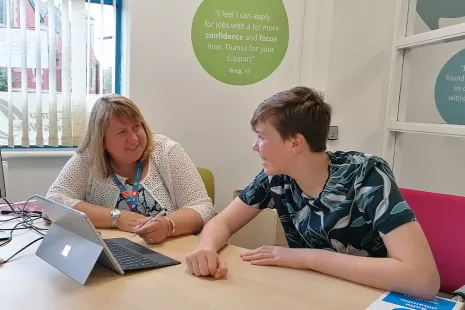Your support will be important to help your child decide what to do after college. We have information to explore the different options and how we can help with each of them.
How Careers Wales can help
Our Careers Advisers are there to support you and your child. They can do this by:
Offering careers interviews
We offer digital appointments for most college students. Your child can book an appointment for themselves or you can book an appointment on their behalf.
If your child is on an Independent Living Skills course or a digital appointment isn't appropriate, we can offer them an interview in-person.
Our Careers Advisers can talk with your child about the options available to them. We can offer practical support like:
- Finding work
- Completing job applications
- Talking to organisations on behalf of your child
Attending transition planning meetings
Careers Advisers can attend transition planning meetings around your child's Individual Development Plan (IDP) or a Statement of Special Educational Needs. They can outline options and support your child with their future plans. Find out more about the IDP and how you can prepare for the review on IDP review.
Attending college events
Your child may also see our Careers Advisers at college events. They can talk to one of the Advisers and find out more about how Careers Wales can help them.
How can I support my child?
Attend review meetings
Take a look at some useful questions you could ask in an Individual Development Plan review meeting. Attending these meetings means you will be:
- Up to date with the support and provision your child is currently receiving
- Aware of how your child is progressing in college and if there are any concerns
- Able to fully support your child with their next steps
Exploring careers and options
Our top tips:
- Make sure your knowledge is up to date. Use Future Jobs Wales to find out about the job market, skills employers are looking for and employment trends
- Encourage your child to think about all the options available. Look at Find out about your options with your child
- Make sure they make full use of the help available to them. Look at Who can help me with your child. Encourage them to make book an appointment to talk to a Careers Adviser
- Show them the My Future YouTube Channel to watch videos about different careers and options
- Encourage them to develop their skills through education, hobbies, work experience and part-time jobs
- If they are nervous about coming to meet a Career Adviser ask them to look at What is a careers interview and watch the video on the page
Our tools can help you both to start thinking about career ideas. Look at:
Options after college
Take a look at the options available to your child when they finish college.
Employment and supported employment
Employment
Your child may feel ready to go into work without any support. Looking for work has information about choosing a job, how to find a job, writing a job application and preparing for an interview.
Sign up to our Job Bulletin to see live vacancies across Wales.
Supported employment
There are several supported employment agencies across Wales. They help young people with additional learning needs to find and maintain employment.
They may offer support with applications, supporting a young person to learn how to travel to work and some will also offer a job coach. Job coaches work alongside a young person helping them to familiarise themselves with the tasks.
Supported employment agencies in Wales are:
Jobs Growth Wales+
When your child leaves college they could join the Jobs Growth Wales+ programme if they are:
- 16 to 19 years old
- Interested in working but not yet ready to enter employment
- In need of work experience
This offers young people the chance to gain work-based skills and qualifications in a training centre or with a local employer. They may also gain valuable work experience and maybe even a paid job in some cases. There are three different levels of training open to your child on Jobs Growth Wales+:
- Engagement – this programme gives your child the opportunity to develop their skills, work on their maths and English and build their confidence and communication. Whilst on engagement they are also able to try vocational tasters and may get experience of the workplace with an employer
- Advancement – if your child is ready for a work placement and knows what type of work they would like to do they could start to work towards a National Vocational Qualification (NVQ) at Level 1
- Employment - if your child is ready for work, they can get help to apply for a paid job placement on Jobs Growth Wales+
Young people who have additional learning needs can access support to enable them to complete their training. Our Careers Advisers can discuss these needs with your child and, with their consent, share these with the provider. If your child has an Individual Development Plan (IDP) they can share this with the provider.
To find out more about Jobs Growth Wales+ and the different levels and support available look at Be a trainee.
Apprenticeships
Apprenticeships are a way of getting experience of work, getting paid and gaining qualifications. There are different levels of apprenticeship from a Foundation Apprenticeship where people work towards a level 2 qualification through to degree level apprenticeships.
Find out more on Apprenticeships. Explore this option with your child by looking at Be an apprentice. Find apprenticeships on Apprenticeship Search.
University
If your child is studying A levels or an equivalent level 3 qualification, they may be considering university. Find out more about Going to university.
Most degree courses last for 3 to 4 years. For young people with ALN there is additional support available. Each university will have staff in student services that can discuss and arrange support. Students with disabilities can apply for financial support.
For further information look at Disabled Students' Allowance on the Student Finance Wales website and Funding for students at university and Funding for students with learning difficulties and disabilities.
Volunteering
If a young person wants to work but isn’t yet ready for paid employment, they could volunteer. This can help to develop skills and confidence as well as providing useful work experience.
Volunteers get involved in all sorts of projects and activities. The amount of time a person spends volunteering can range from a one-off involvement to a regular commitment of time each week.
You can find out more about volunteering on Volunteering, Wales Council for Voluntary Action (WCVA) and Volunteering Matters.
Day Service Provision
For some young people day services may be the most appropriate option. Day services are provided by the local authority social services department or voluntary organisations. Find out more on Have a daytime plan.
There are a number of options, depending on what is available in the local area but typically these may include:
- Daily living skills
- Leisure and recreational activities
- Vocational training
- Community and voluntary projects
- College links
- Work experience
Social services assess your child's needs and discuss the options available. If you are interested in exploring this option, you would need to discuss this with your social worker or contact their social services department.
You might also like

Find out more about the Individual Development Plan (IDP) and how you can prepare for the review.

Find out the support available from Careers Wales to help you and your child plan for the future.

